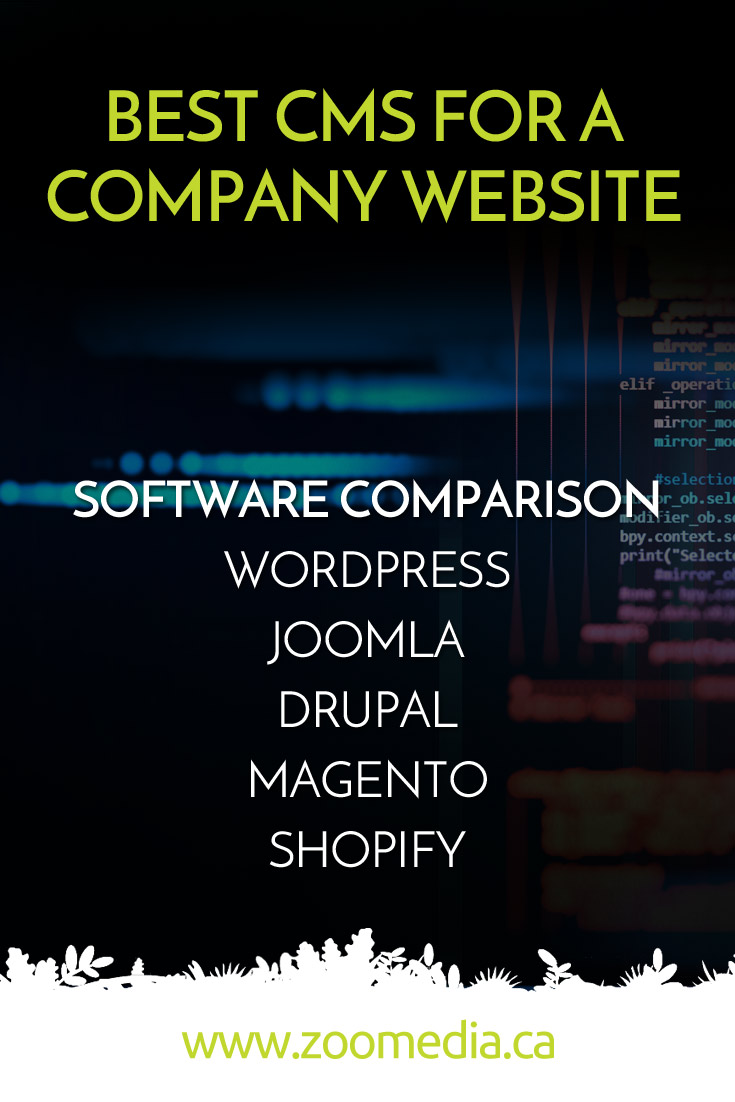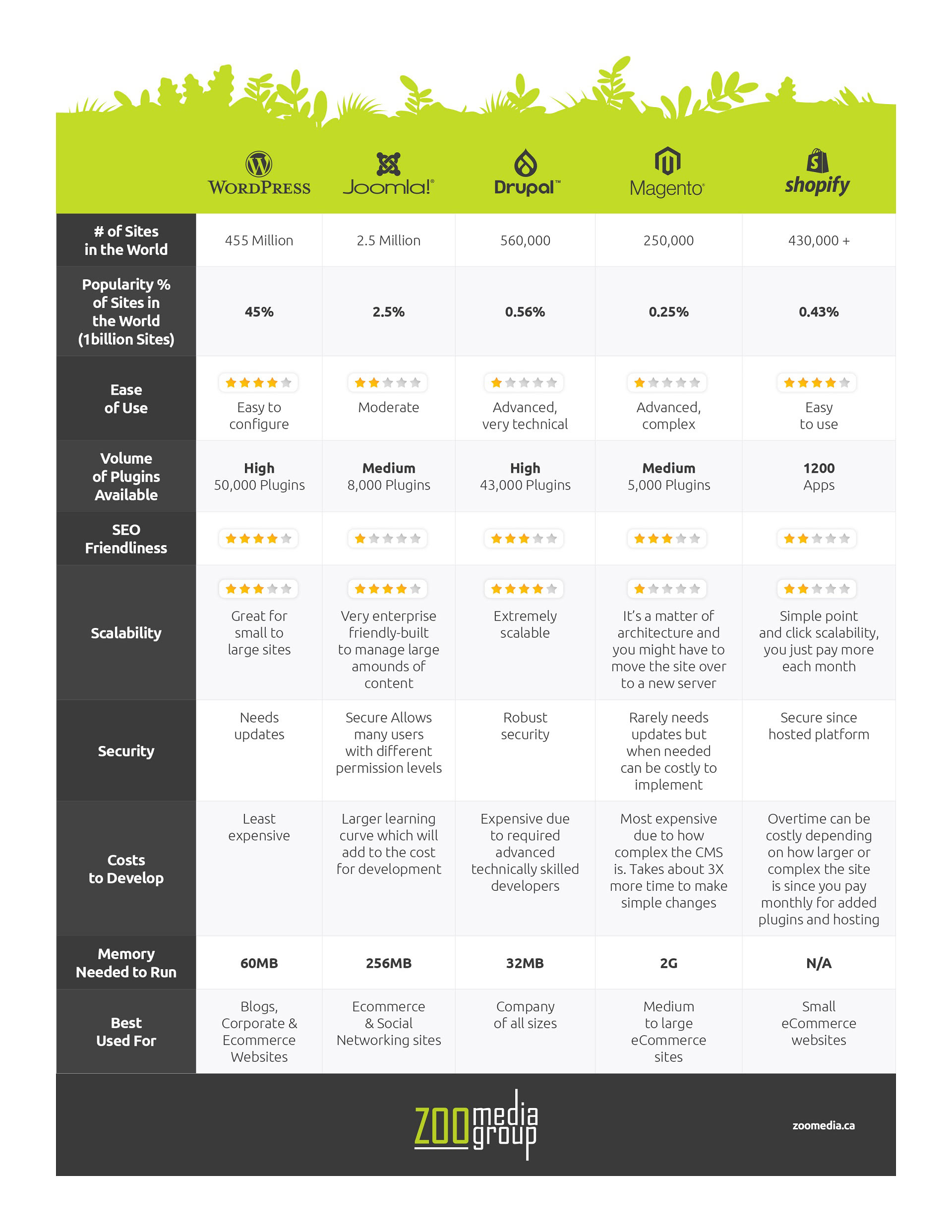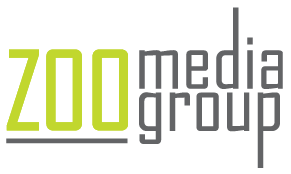Choosing the Best CMS Software For Your Website
When it comes to building a website, most companies prefer to stick with what they know and hire someone that specializes in that kind of thing. Of course, there are also companies that have someone or a team of people that is capable of and excels at digging into the digital details. And then, there are organizations somewhere in the middle.

No matter where you fall on the spectrum, ZOO Media Group can guide your company in making the best decisions for your unique goals, budget and situation. It can be pretty confusing when you hear some of the tech terms thrown around and you’re not completely sure what they mean. In this article, we’re going to review some of the top options for Content Management Systems (CMS) and the pros and cons of each. Hopefully this will help you understand your options when building a dynamic website.
A CMS will allow you to build and manage most of the elements of your website without needing specialized coding skills. With this easy-to-use platform, it allows some companies to get up and running with a basic site without having to hire a professional. However, with limited knowledge comes limited outcomes. It does help to have a basic understanding of how these things work when setting up a website.
In this article we will compare WordPress, Joomla and Drupal as well as the ecommerce options like Shopify and Magento CMS software. Each has unique advantages which we will share with you.
We’ll start with a brief overview of each platform and jump into some comparisons below.
Scroll down to view or click to download our CMS Comparison Chart.
Content Management Software Overview
WordPress has its roots as a blogging platform suitable for newbies. It gained popularity which led to a boom in development of themes and plugins. This vast array of options makes it a clear choice for any type of website. It is easy to use and websites can be set up quickly, but it can also be customized by using a large selection plugins including WooCommerce. WordPress is best-suited to less complex websites and managed by users without a lot of technical skills. WordPress websites are easier to build and therefore, often less expensive than the other CMS software available.
Joomla requires a bit more technical know-how than WordPress and doesn’t have as many themes and plugins available. However, it can be used to build a wide variety of websites, including ecommerce. Joomla offers registered users making it ideal for setting up intricate websites that allow certain content to be accessed only by registered users.
Drupal is ideal for creating complex websites but is also the most difficult to use. It will require the work of developers with an understanding of using Drupal. This platform is capable of processing a lot of data and can accommodate heavy traffic. It is best used for large, powerful websites and a technical team with the knowledge to manage it.
Shopify is an easy-to-use platform to quickly and easily set up an online store. This option allows users to customize their store with a “what you see is what you get” editor. There is a monthly Shopify fee with several plan options. Over time, this could become a costly option.
Magento is an open source platform that specializes in ecommerce. It allows flexibility over the look, content and functionality but many aspects require configuration. It requires some time for set up and more complex programming is required. However, Magento does offer a lot report options for sales and accounting.
CMS Costs & Expense
Looks can be deceiving and although something appears to be free IF you have the time and skills to build the site yourself, but we all know that nothing really is! We are not comparing apples to apples, so we will do our best to break down the costs and expenses with each platform, but it is difficult to give a black and white comparison.
WordPress, Joomla, Drupal and Magento are all free to download, but there are other costs associated with getting started. The first startup cost will be domain name and web hosting. Your domain name is the URL of your website, for example www.mycompany.ca. This domain name is a minimal cost and will need to be renewed each year. Web hosting is where your website sits and how your users can access it. This is also a minimal cost. So, all of the platforms are on an equal playing field when it comes to getting set up initially.
While the platforms are free to download, you will most likely want to extend your options with some extra plugins and theme packages if you don’t have an eye for design or programming experience. Themes allow you to choose a design package for your site which means all of the elements work well together and are aesthetically pleasing. WordPress, Joomla and Drupal all have these options available for similar costs, depending on your needs.
Magento operates in a similar way with the platform being free but you pay for hosting, domain and extensions. Costs can vary greatly with Magento with some themes costing 10 times that of a WordPress theme. This platform is aimed at large businesses.
Shopify, on the other hand, is a hosted platform. All of your hosting details are included in the fixed monthly rate with several price plans to choose from. Any plugins you need with be added to your monthly fee and these can really add up for more complex websites!
CMS Popularity
WordPress is the king of the jungle these days. In fact, this chart shows the breakdown and WordPress is firmly in the lead as far as popularity. Because so many websites are using this platform, it has more options as far as plugins, themes, and developers. Keep this in mind if you’re looking to do most of the work in-house. WordPress keeps it fairly simple yet gives lots of options for building out a more complicated design. They also offer their own e-commerce platform called WooCommerce for a great shopping cart experience. It can easily be integrated with other software such as accounting and inventory systems. In fact, given the popularity of WordPress, adding ecommerce to an existing WP site can easily be accomplished with WooCommerce.
Because Drupal and Joomla require a bit more behind-the-scenes work, less websites use these platforms. Not as many out-of-the-box designs are available for Drupal and Joomla making it a bit more complicated to get your desired outcome. However, when you partner with ZOO Media Group, we have skilled website developers that can work in any of the platforms.
Shopify has more websites than Magento but that is likely attributed to its ease of use. If you’re looking for a basic ecommerce site, Shopify has more options that are out-of-the-box than Magento. And Magento offers more robust options for designing a custom site for your unique needs than Shopify… However, we feel that WordPress with WooCommerce is the most versatile and economical option in most cases.
Content Management System Ease of Use
A Content Management System (CMS) is designed to make it easier for businesses to manage their website. However, as indicated above, the various systems are at different positions on the spectrum.
WordPress is quite popular for this very reason. It is fairly easy for the average person to operate and have a stylish, yet basic website. It is capable of much more than basic, but it will take a bit more know-how to effectively manage the right plugins and ensure the design is not only esthetically pleasing but also navigates easily. Depending on the needs of your team, you may choose to have the ZOO Media Group oversee the initial setup of the site. This could include designing the distinct web pages, developing the site navigation and setting up most, if not all, content pages. Then, once the site is launched you can add information on an as-needed basis yourself. Or we can partner with you and act on your behalf for all website design and development needs.
Drupal assumes a certain familiarity with HTML. It is not designed for a DIYer looking to set up their own site, however, it does offer more custom functionality. So, if your website requires unique processes or components, Drupal has endless capability with an experienced programmer taking the lead.
Joomla is similar in that it does require an understanding of coding to tweak the standard offering into something that stands out for your business. Fortunately, our ZOO Media team has skilled professionals to help with your project.
On the ecommerce side of things, Shopify offers a comprehensive set up and is easy to use. It is designed to get businesses up and running quickly and effectively.
Magento has a steeper learning curve and will require coding and some time to get set up. However, it does offer a flexible platform with lots of room for customization.
When setting up your ecommerce site, you must consider what you expect your end product to be, how often it will be updated or changed and how unique your needs are. While Shopify is a more user-friendly platform, Magento offers more flexibility.
CMS Add-Ons
The nice thing about all of these platforms is the number of add-ons (also called plugins, modules, extensions, apps, etc.). These extras allow you to personalize the basic features of your CMS.
It stands to reason that because there are more WordPress sites out there, there are also more plugins available. There are also extensions for Joomla and modules for Drupal but there just is not as much variety as there is for WordPress. Typically, Drupal modules are more for developers – helping them further tweak the inner structure of Drupal but not something the end-user would see.
Magento and Shopify both offer apps to customize your online shopping experience. While Magento has more options, they require some coding to get them where you need them to be whereas Shopify has polished apps available that are easy to use.
Content Management Software Security and Updates
If security is a top priority for your website, here is an overview on how the platforms stack up.
Although the majority of infected websites are WordPress, we must remember that the majority of websites are WordPress, so hackers are drawn to it naturally. However, it is worth noting that the issue is not with the core software but the third-party applications. If WordPress software and the third-party plugins are updated on a regular basis, security should not an issue.
Drupal has strong coding standards and a stringent community code review process. This means it has robust security and many governments, corporations and brands depend on that security to protect mission-critical sites.
Joomla allows for many registered users and members with different permission levels for distinct user groups. This allows you to limit access to various parts of the site.
When it comes to online sales, customers depend on a secure site to conduct business, so you’ll want to ensure a safe place for your users. Shopify’s hosted platform protects against hacker attacks and routinely sends updates and patches to assure your site has high security.
Magento security is more of a do-it-yourself strategy. They will release patches for known security risks, but it is up to your website manager to ensure your site is up to date. Because of the complexity, a skilled web developer would need to complete these types of security patches and updates.
The best thing you can do to protect your site is to ensure it is current — both the CMS software itself and all of the plugins. Most times you can complete these updates yourself and the majority of the time everything will be fine. However, in some cases an update to a plugin or the core CMS will cause a conflict and functionality, or site design can be affected.
When doing a core update, it is recommended that a backup of the site files are taken just in case there are massive conflicts and you need to revert back to the previous version of the site. We do offer a warning about doing the updates yourself — if there is an issue, our ZOO Media team may not be able to jump on the fix right away due to project scheduling.
The other option is to ask us to do the updates for you. We can perform software and plugin updates monthly or even every couple of months (sometimes there are not a lot of updates released). In most cases, the process is fairly quick and there are no issues. But if there are issues, our team is on site and can address it right away. We also take a backup of the site to ensure there will be no down time in the event there are issues resulting from the software updates. We generally leave it up to our clients concerning how they would like to manage their website rather than setting a regular schedule for updates.
Our team highly recommends website CMS software is kept up to date. In addition to potential damage to your search ranking, hacking incidents are time consuming and expensive to clean up. So, spending the time to keep the site updated throughout the year will be more cost effective. Some web agencies charge ongoing monthly fees for website maintenance, but we choose not to. Some months there will be very little work to do and we only want to charge our clients for actual time spent working on the site. Clients may also choose to do the updates themselves and only contact us if issues arise from the updates.
In Conclusion
We hope this overview gives you a better understanding of these CMS software options and what might work best for your website. We work collaboratively with our clients throughout North America and can offer as much or as little support as needed. Contact us today to schedule a free phone consultation with ZOO Media Group, London, Ontario’s web development agency. Let us be your guide.





